Emergency HVAC Buxton
Find the best Emergency HVAC in Buxton
Get multiple Emergency AC Repair quotes for your project today! Compare profiles, reviews, accreditations, portfolio, etc... and choose the best service.

TitanFlameltd-Glossop
51 reviews175 High St W, Glossop, SK13 8HJ, GBTitan Flameltd is a local plumbing emergency call out service with over 20 years of experience in plumbing and heating. We strive to complete every job with the highest skill and best customer service. Our team of emergency plumbers and heating engineers are available 24/7 to provide fast, reliable solutions. We offer a range of services including appliance installation, bathroom plumbing, emergency plumbing, immersion heaters, kitchen plumbing, outdoor plumbing, tap repair and install, pipe repair, boiler installation and repair, water heater installation and repair, radiator installation and repair, gas line installation and repair, furnace installation and repair, heat pump installation and repair, drain cleaning, plumbing repairs, pipe installation and repair, water treatment, and sewer line repair and replacement. We are available 24/7 and offer quick appointments, fast, efficient services, and expert support when you need it most.
- Services
- Why Us?
- Gallery
Get Quote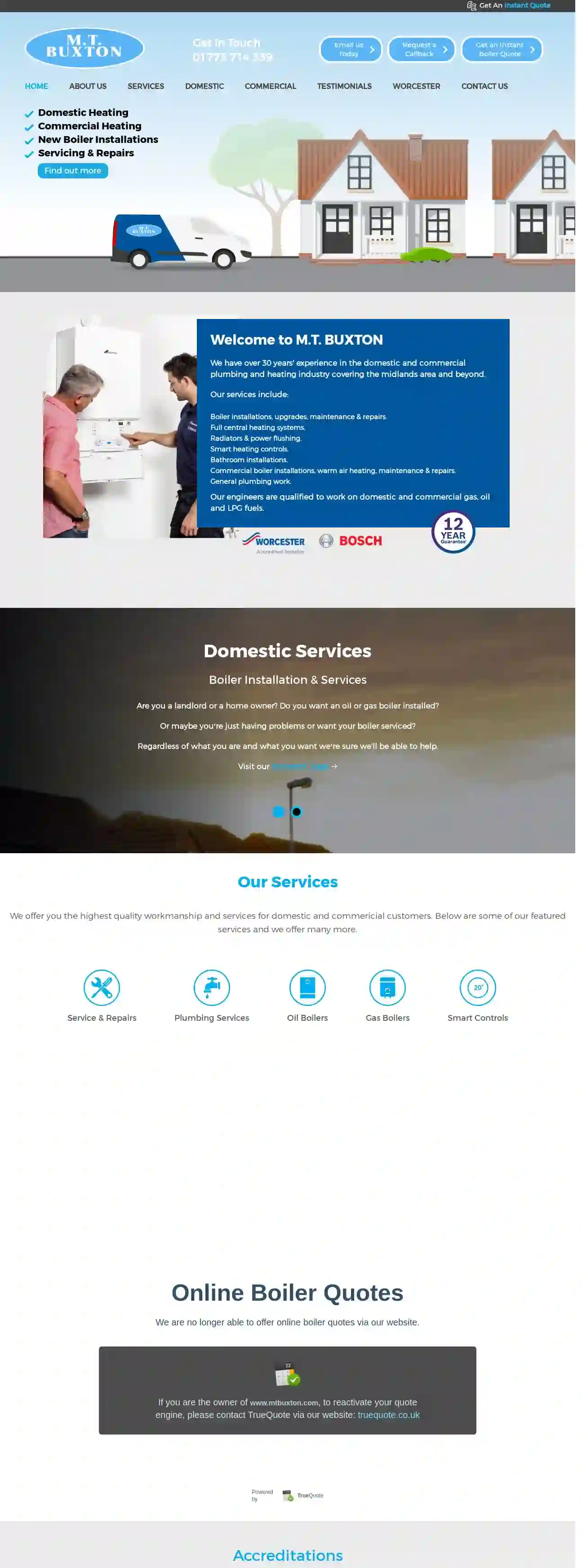
M T Buxton Plumbing & Heating
423 reviewsLangley Mill, 237-241 Station Road, Nottingham, NG16 4AD, GBM.T. Buxton Plumbing & Heating is a company with a structured management team which has a wealth of experience on a variety of domestic and commercial work. We have a solid client base reflecting the twenty four years the company has been in existence and as any reliable contractor we are always seeking to expand and develop. Our client list currently includes the Co-Operative Group, Sandicliffe Motors and Repton School to name just a few. We are confident and well able to meet the demands in providing both quality and competitive quotations for a wide spectrum of domestic and commercial work. We are adequately staffed to handle a wide range of contracts from domestic works up to the multi-disciplined service installations associated with larger projects. The company's Senior management, and the assigned contracts engineer, closely monitor the installations to maintain our high standard of workmanship, working closely with all of our directly employed labour force. Our company strategy pursues contracts throughout the UK which would include installation work, planned and reactive maintenance. We trust this proves of sufficient interest and we would welcome any enquires either by our contact page.
- Services
- Why Us?
- Accreditations
- Gallery
Get Quote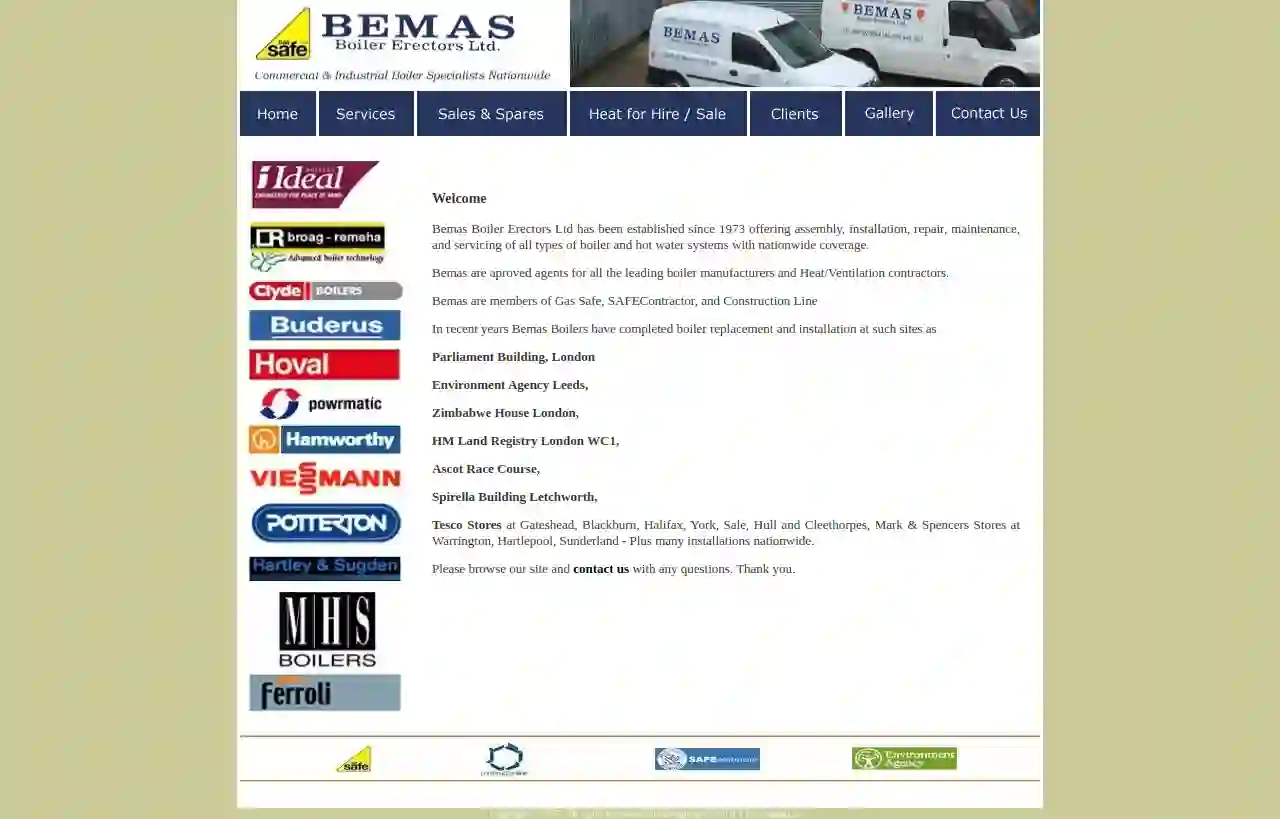
Bemas Boilers Ltd
Cilfton Avenue, Long Eaton, NG10 2GA, GBBemas Boiler Erectors Ltd has been established since 1973 offering assembly, installation, repair, maintenance, and servicing of all types of boiler and hot water systems with nationwide coverage. Bemas are approved agents for all the leading boiler manufacturers and Heat/Ventilation contractors. Bemas are members of Gas Safe, SAFEContractor, and Construction Line. In recent years Bemas Boilers have completed boiler replacement and installation at such sites as Parliament Building, London, Environment Agency Leeds, Zimbabwe House London, HM Land Registry London WC1, Ascot Race Course, Spirella Building Letchworth, Tesco Stores at Gateshead, Blackburn, Halifax, York, Sale, Hull and Cleethorpes, Mark & Spencers Stores at Warrington, Hartlepool, Sunderland - Plus many installations nationwide. Please browse our site and contact us with any questions. Thank you.
- Services
- Why Us?
- Gallery
Get Quote
GasCare
4.9539 reviewsGlossop, GBGasCare is a trusted partner for all your home heating needs. We offer a range of services, including boiler installation, repair, servicing, and smart heating solutions. Our team of experienced engineers is dedicated to providing prompt and reliable service, ensuring your home is warm and comfortable year-round. We understand that a faulty boiler can be a major inconvenience, which is why we offer 24-hour emergency call-out services. We also provide free energy audits to help you save money on your energy bills. At GasCare, we're committed to making your life easier when it comes to heating your home.
- Services
- Why Us?
- Gallery
Get Quote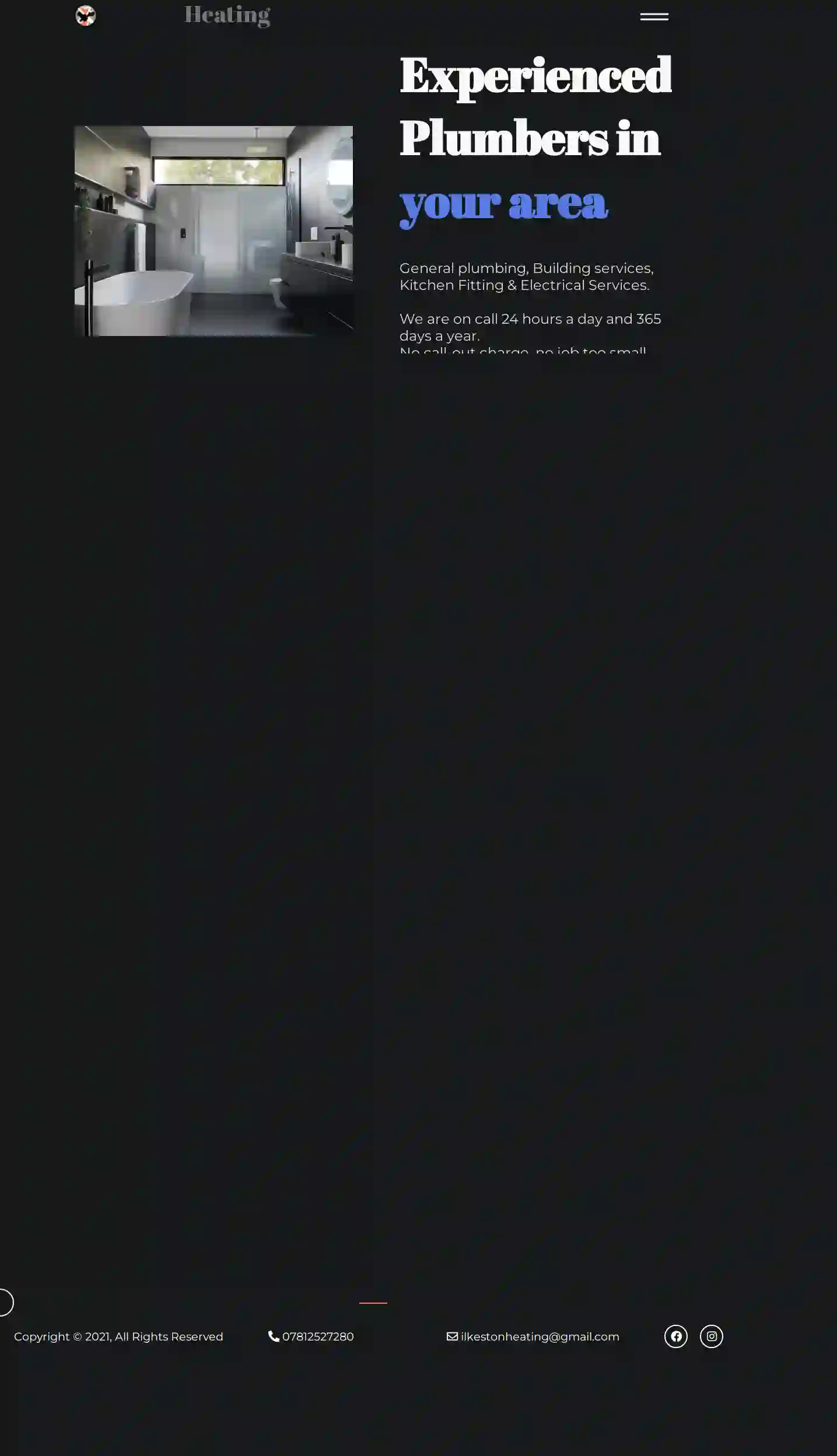
Ilkeston Heating And Plumbing Solutions
4.846 reviewsIlkeston, GBExperienced plumbers and kitchen fitters with a combined experience of 25 years, our team has been providing solutions for you throughout Derbyshire, Leicestershire, Staffordshire and Nottinghamshire. We are on call 24 hours a day and 365 days a year. No call-out charge, no job too small. We offer a range of services including bespoke kitchens, new bathrooms, joinery services, and more. Contact us to learn more.
- Services
- Why Us?
- Our Team
- Testimonials
- Gallery
Get Quote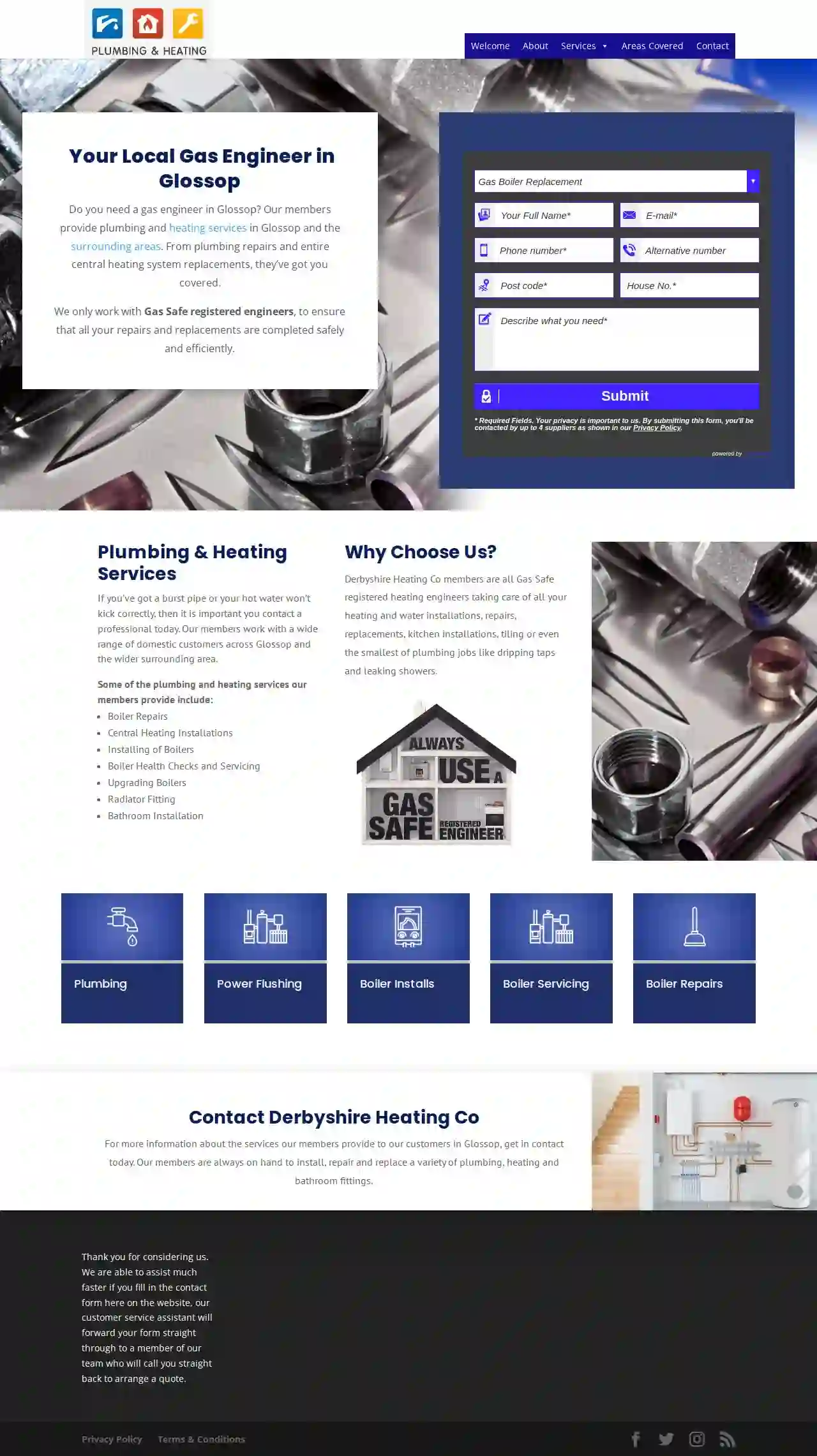
Gas Safe UK
Unit 1, 10-12, The Old Mill, Glossop, DE1 1AA, GBDerbyshire Heating Co connects you with Gas Safe registered heating engineers across Derbyshire and the surrounding areas. Whether you need a plumber, boiler installation, repairs, or servicing, our members are here to help. They handle everything from burst pipes and hot water issues to full central heating system replacements, kitchen installations, tiling, and even small jobs like dripping taps. Contact Derbyshire Heating Co today for a quote and experience reliable, efficient service from trusted professionals.
- Services
- Why Us?
- Accreditations
- Gallery
Get Quote
GasTech/CoolTech - Plumbing, Heating, Gas, Air Conditioning & ASHP Services Ltd
512 reviewsMidway, 12 Copse Rise, Swadlincote, DE11 7NG, GBAt GasTech/CoolTech, we are experts in gas, heating, and plumbing installation, boiler maintenance/service, and breakdown. We offer air conditioning and air source heat pump installation. We pride ourselves on the highest possible standards of workmanship and customer satisfaction. We are friendly, experienced, fully qualified, insured, and registered with Gas Safe (formerly known as CORGI). We are fairly priced and offer fixed prices on other jobs such as boiler installs or bathroom installations. We are always up front in all our pricing so you know we are a company you can trust. We offer a call out service for emergency boiler breakdowns, gas leak detection, water leaks, etc. We look forward to hearing from you soon and thank you for visiting. Please feel free to check us out on Facebook. There are many more examples on our Facebook page at https://www.facebook.com/GasTechLJ COMPANY GAS SAFE NUMBER 634228 COMPANY FGAS NUMBER FGAS-3013578
- Services
- Why Us?
- Accreditations
- Our Team
- Gallery
Get Quote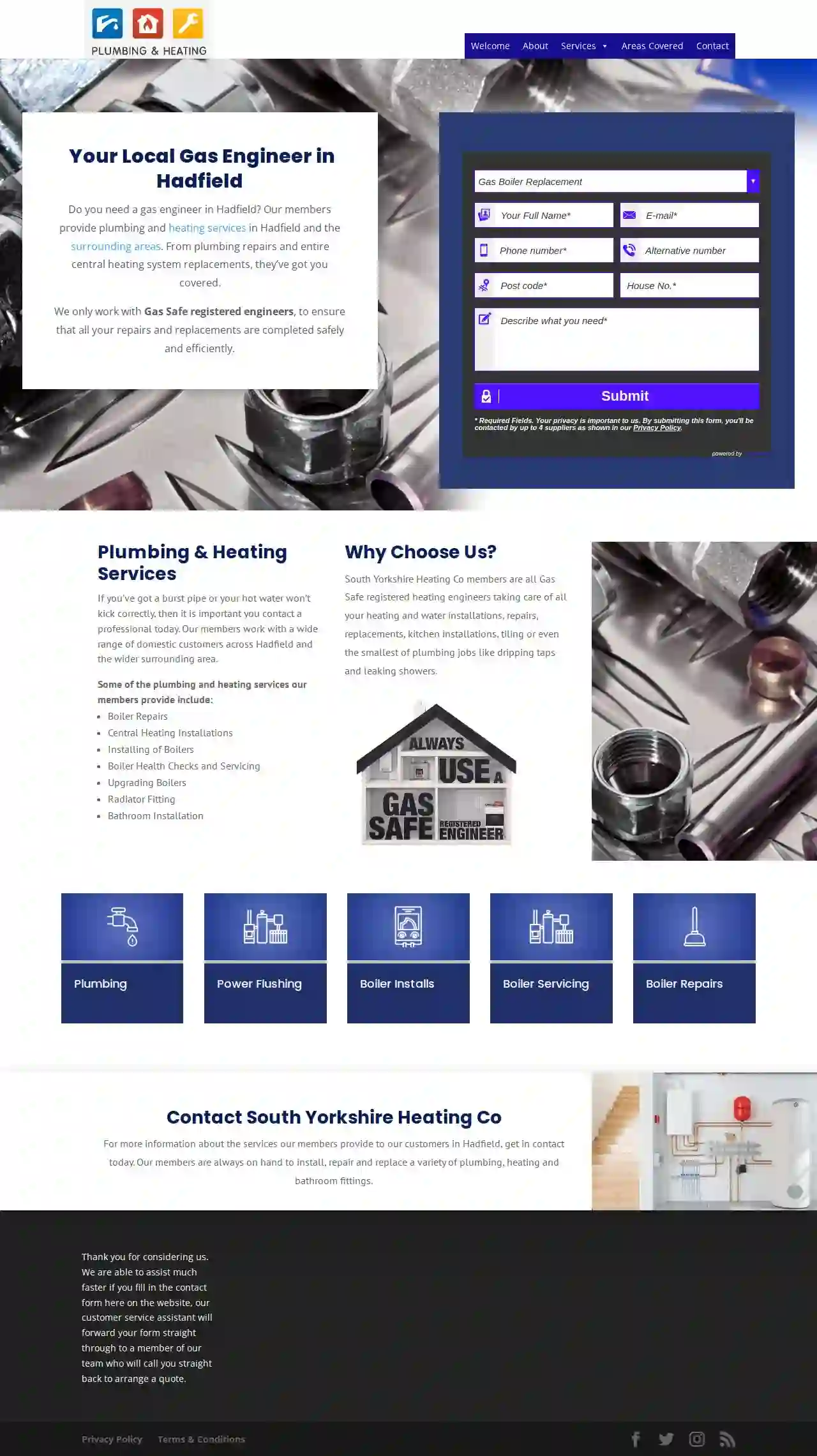
MWF HEATING SERVICES LTD
54 reviewsUnit 1, 100-102, Sheffield Road, Hadfield, S20 1AA, GBSouth Yorkshire Heating Co connects you with Gas Safe registered heating engineers across South Yorkshire and the surrounding areas. Whether you need a plumber or a heating engineer, our members are here to help with all your plumbing and heating needs, from small repairs to complete system replacements. They provide a wide range of services, including boiler installations, repairs, servicing, power flushing, smart thermostat installations, and more. For peace of mind, all our members are fully qualified and insured, ensuring your work is completed safely and efficiently.
- Services
- Why Us?
- Gallery
Get Quote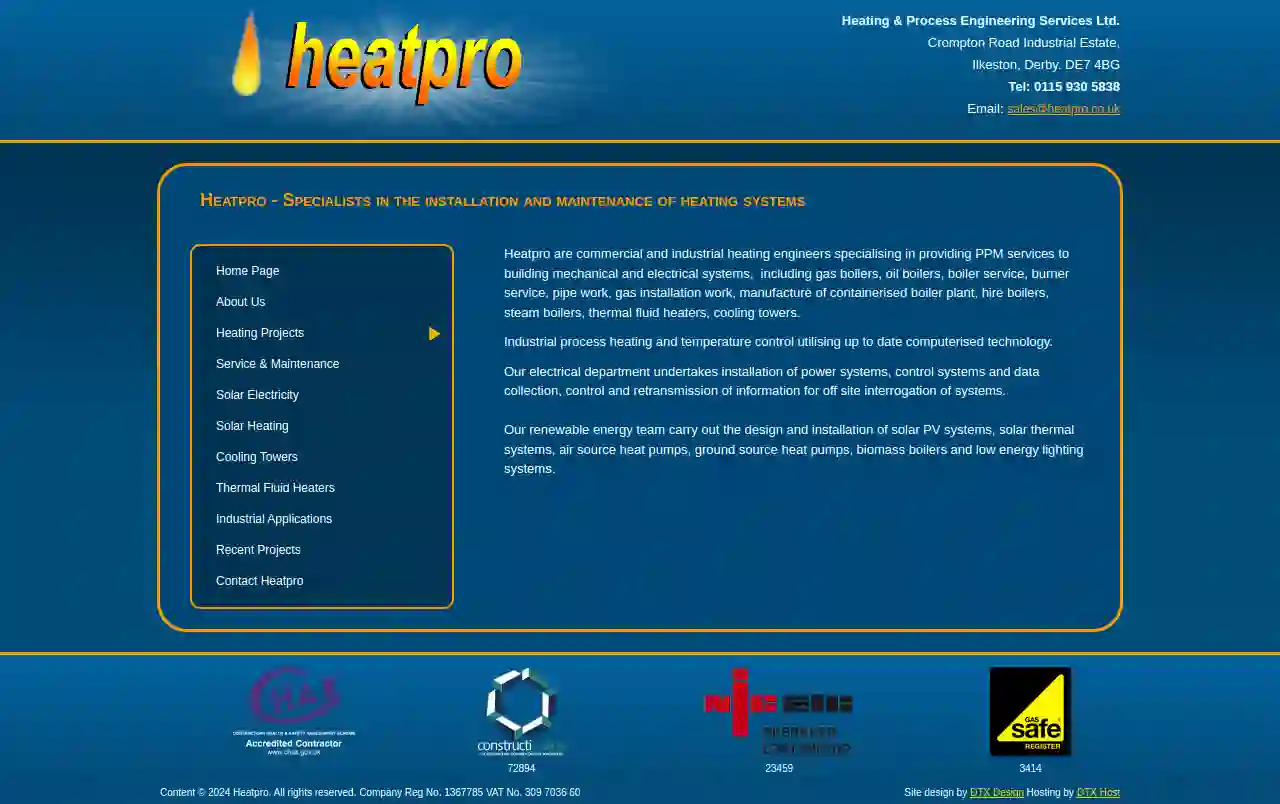
Heating & Process Engineering Services Ltd
44 reviewsIlkeston, Derby, Crompton Road Industrial Estate, DE7 4BG, GBHeating & Process Engineering Services Ltd. is a company that specialises in providing PPM services to building mechanical and electrical systems, including gas boilers, oil boilers, boiler service, burner service, pipe work, gas installation work, manufacture of containerised boiler plant, hire boilers, steam boilers, thermal fluid heaters, cooling towers. We also provide industrial process heating and temperature control utilising up to date computerised technology. Our electrical department undertakes installation of power systems, control systems and data collection, control and retransmission of information for off site interrogation of systems. Our renewable energy team carry out the design and installation of solar PV systems, solar thermal systems, air source heat pumps, ground source heat pumps, biomass boilers and low energy lighting systems.
- Services
- Why Us?
- Gallery
Get Quote
Complete Cooling Services Ltd
524 reviewsUnit 4a, Huss's Lane, Long Eaton, NG10 1G, GBComplete Cooling Services is a local HVAC engineers company providing the best services for heating, ventilation & air conditioning. With over 107 years of combined industry experience and knowledge, our team of highly trained and skilled HVAC engineers deliver exceptional services. We provide a seamless and reliable service when it comes to your HVAC systems installation, maintenance and repairs. Our services include air conditioning installation, repairs, service & maintenance, planned preventative maintenance, and more. We are a local company dedicated to ensuring that all of our customers get the very best service and support when it comes to their air conditioning and comfort cooling requirements.
- Services
- Why Us?
- Our Team
- Gallery
Get Quote
Over 12,692+ HVAC Businesses on our platform
Our HVAC experts operate in Buxton & surrounding areas!
HVACCompaniesHub has curated and vetted the Best HVAC Contractors in and around Buxton. Find a reliable contractor today.
Frequently Asked Questions About Emergency HVAC Services
- Improve Energy Efficiency
- Extend System Lifespan
- Prevent Costly Repairs
- Enhance Indoor Air Quality
- Identify Potential Problems Early
- Ensure System Reliability
- Uneven Temperatures: Some rooms in your house might be significantly hotter or colder than others.
- High Energy Bills: An undersized or oversized system will be inefficient and increase your utility costs.
- Frequent Cycling: An oversized system will turn on and off too frequently, which can lead to premature wear and tear.
- Poor Humidity Control: Incorrect sizing can cause inadequate humidity control.
- MERV Rating: The Minimum Efficiency Reporting Value (MERV) indicates the filter's ability to trap particles. Higher MERV ratings mean better filtration.
- Filter Size: Make sure you select the correct size filter for your HVAC unit.
- Filter Type: Different types of filters are available, including pleated filters, HEPA filters, and electrostatic filters.
- Your Needs: Consider your indoor air quality needs. If you have allergies or pets, a higher MERV filter may be beneficial.
What is a smart thermostat, and how can it save me money?
What are the benefits of a preventative HVAC maintenance plan?
How can I tell if my HVAC system is the correct size for my home?
How do I choose the right HVAC filter?
What is a smart thermostat, and how can it save me money?
What are the benefits of a preventative HVAC maintenance plan?
- Improve Energy Efficiency
- Extend System Lifespan
- Prevent Costly Repairs
- Enhance Indoor Air Quality
- Identify Potential Problems Early
- Ensure Safe and Reliable Operation
How can I tell if my HVAC system is the correct size for my home?
- Uneven Temperatures: Some rooms in your house might be significantly hotter or colder than others.
- High Energy Bills: An undersized or oversized system will work harder and consume more energy.
- Frequent Cycling: An incorrectly sized AC unit will turn on and off too frequently, reducing its lifespan.
- Poor Humidity Control: Incorrect sizing can cause inadequate humidity control.
How do I choose the right HVAC filter?
- MERV Rating: The Minimum Efficiency Reporting Value (MERV) indicates the filter's ability to trap particles. Higher MERV ratings mean better filtration.
- Filter Size: Make sure you select the correct size filter for your HVAC unit.
- Filter Type: Different types of filters are available, including pleated filters, HEPA filters, and electrostatic filters.
- Your Needs: Consider your indoor air quality needs. If you have allergies or pets, a higher MERV filter may be beneficial.